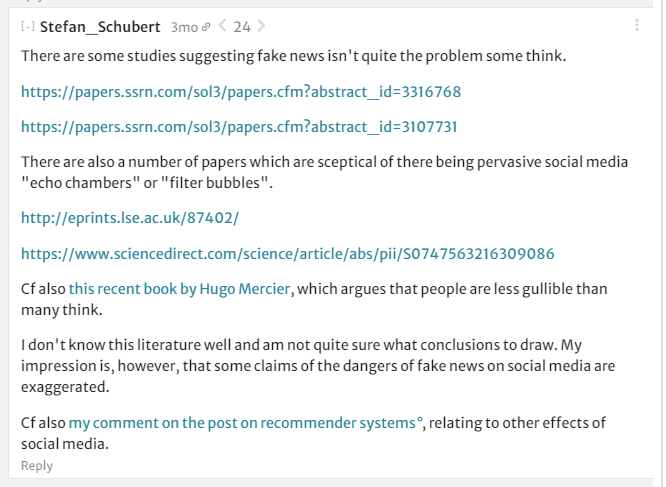Dear EAs,
After the interview with Tristan Harris Rob asked EAs to do their own research on the topic of aligning recommender systems / short term AI risks. A few weeks ago I already posed the short question on donating against these risks. After that I listened to the 2.5 hour podcast on the topic and read multiple articles on this topic on this forum (https://forum.effectivealtruism.org/posts/E4gfMSqmznDwMrv9q/are-social-media-algorithms-an-existential-risk, https://forum.effectivealtruism.org/posts/xzjQvqDYahigHcwgQ/aligning-recommender-systems-as-cause-area, https://forum.effectivealtruism.org/posts/ptrY5McTdQfDy8o23/short-term-ai-alignment-as-a-priority-cause)
I would love to collaborate with some others on collecting more in-depth arguments including some back- of-the-envelope calculations / Fermi estimates on the possible scale of the problem. I've spent some hours creating a structure including some next steps. In particular we should focus on the first argument since I feel the mental health one is very shaky after recent research.
I didn’t start reading the mentioned papers (except for the abstracts). We can define multiple work streams and divide them between possible collaborators. My expertise is mostly in back- of-the-envelope calculations / Fermi estimates given my background as management consutant. I am especially looking for people who like to / are good at assessing the value of scientific papers.
Please drop a message below or send an e-mail to jan-willem@effectiefaltruisme.nl if you want to participate
Arguments in favour of aligning recommender systems as cause area
Social media causes political polarization
- Polarization causes less international collaboration
- Proved by paper?
- Brexit: What are the odds that social media was decisive in the outcome?
- https://journals.sagepub.com/doi/pdf/10.1177/0894439317734157
- https://comprop.oii.ox.ac.uk/wp-content/uploads/sites/93/2017/12/Russia-and-Brexit-v27.pdf
- https://www.theguardian.com/commentisfree/2020/jul/21/russian-meddling-brexit-referendum-tories-russia-report-government
- Trump: What are the odds that social media was decisive in the outcome?
- Less appetite for EU
- Brexit: What are the odds that social media was decisive in the outcome?
- This increases risks for other (X-)risks:
- Extreme Climate change scenarios
- Estimate Trump’s impact on climate (What is the chance that an event like this causes certain amplifiers of climate change to push us towards extreme scenarios?)
- Direct
- Indirect through other countries doing less
- Show that more instead of less international collaboration is needed if you want to decrease the probability of extreme scenarios
- Estimate Trump’s impact on climate (What is the chance that an event like this causes certain amplifiers of climate change to push us towards extreme scenarios?)
- Nuclear war (increasing Sino-American tensions)
- AI safety risks from misuse (through Sino-American tensions)
- (Engineered) Pandemics
- Can we already calculate extra deaths caused through misinformation?
- Increased chances of biowarfare
- Lower economic growth because of trade barriers / protectionist measures
- Calculate extra economic growth from EU to calculate what it will cost is the EU falls apart?
- Convert to possible additional QALY’s?
- Calculate extra economic growth from EU to calculate what it will cost is the EU falls apart?
- Extreme Climate change scenarios
- Proved by paper?
Next steps here:
- Find papers for all the relevant claims
- Look at Stefan_Schuberts counterarguments below (https://forum.effectivealtruism.org/posts/E4gfMSqmznDwMrv9q/are-social-media-algorithms-an-existential-risk)
- Synthesize findings from papers that prove political polarisation
- Show papers that prove that political polarisation led to less international cooperation
- Look for cases (Trump / Brexit) where social media are to be blamed. Calculate the chance that social media actually flipped the election there
- Make back- of-the-envelope calculations / Fermi estimates for all relevant negative consequences

Social media causes declining mental health
- Doesn’t seem to be the case after doing a short review
- https://journals.sagepub.com/doi/10.1177/2167702618812727)
- https://lydiadenworth.com/articles/social-media-has-not-destroyed-a-generation/
- https://www.sciencedirect.com/science/article/abs/pii/S0747563219303723
This one looks interesting as well: https://docs.google.com/document/d/1w-HOfseF2wF9YIpXwUUtP65-olnkPyWcgF5BiAtBEy0/edit#
Next steps here:
- Countercheck these paper
- If we find prove that it causes mental health to decline: calculate lost QALY’s (see https://forum.effectivealtruism.org/posts/xzjQvqDYahigHcwgQ/aligning-recommender-systems-as-cause-area#Scale for first estimate)
Aligning recommender systems is “training practice” for larger AI alignment problems
Next step here:
- Should we expand this argument?
The problem is solvable (but we need more capacity for research)
See e.g. https://www.turing.ac.uk/sites/default/files/2020-10/epistemic-security-report_final.pdf
Next step here:
- Collect additional papers on solutions
- What kind of research is interesting and would be worthwhile investing in?

Thank you for doing this! It's important to know what the science says about these issues because it helps public interest technologists who want to address these problems avoid wasting effort. I don't have the bandwidth to work on this right now, but I wish you the best of luck!
Here's a 2017 review paper about the impact of digital technologies on children's well-being.